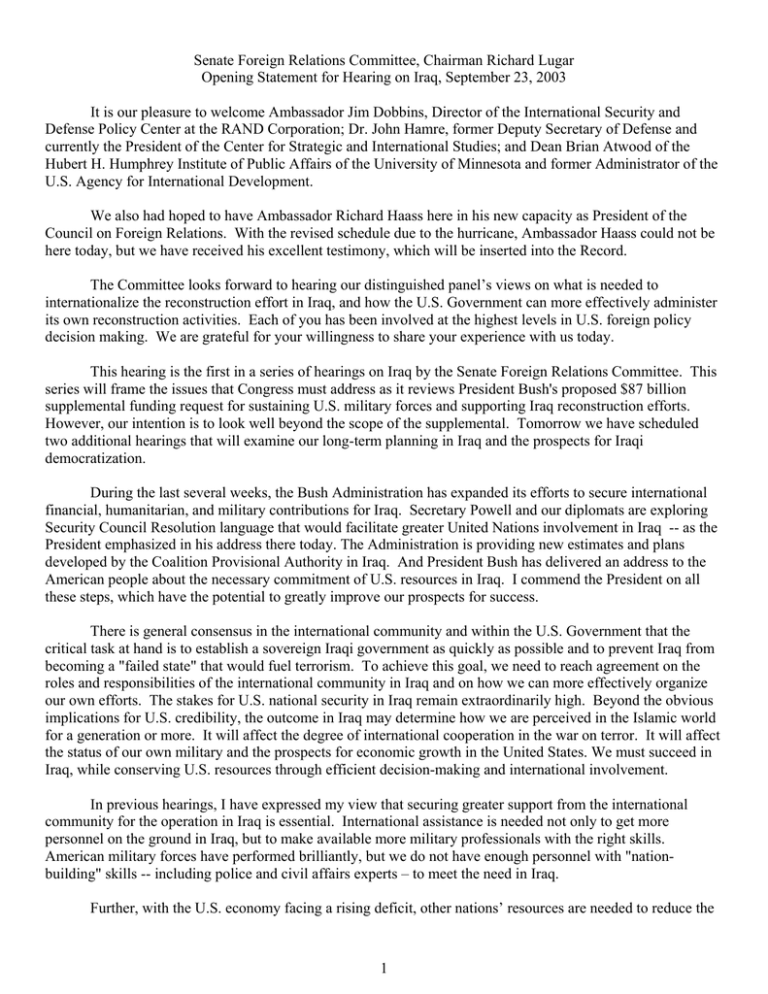Senate Foreign Relations Committee, Chairman Richard Lugar
advertisement

Senate Foreign Relations Committee, Chairman Richard Lugar Opening Statement for Hearing on Iraq, September 23, 2003 It is our pleasure to welcome Ambassador Jim Dobbins, Director of the International Security and Defense Policy Center at the RAND Corporation; Dr. John Hamre, former Deputy Secretary of Defense and currently the President of the Center for Strategic and International Studies; and Dean Brian Atwood of the Hubert H. Humphrey Institute of Public Affairs of the University of Minnesota and former Administrator of the U.S. Agency for International Development. We also had hoped to have Ambassador Richard Haass here in his new capacity as President of the Council on Foreign Relations. With the revised schedule due to the hurricane, Ambassador Haass could not be here today, but we have received his excellent testimony, which will be inserted into the Record. The Committee looks forward to hearing our distinguished panel’s views on what is needed to internationalize the reconstruction effort in Iraq, and how the U.S. Government can more effectively administer its own reconstruction activities. Each of you has been involved at the highest levels in U.S. foreign policy decision making. We are grateful for your willingness to share your experience with us today. This hearing is the first in a series of hearings on Iraq by the Senate Foreign Relations Committee. This series will frame the issues that Congress must address as it reviews President Bush's proposed $87 billion supplemental funding request for sustaining U.S. military forces and supporting Iraq reconstruction efforts. However, our intention is to look well beyond the scope of the supplemental. Tomorrow we have scheduled two additional hearings that will examine our long-term planning in Iraq and the prospects for Iraqi democratization. During the last several weeks, the Bush Administration has expanded its efforts to secure international financial, humanitarian, and military contributions for Iraq. Secretary Powell and our diplomats are exploring Security Council Resolution language that would facilitate greater United Nations involvement in Iraq -- as the President emphasized in his address there today. The Administration is providing new estimates and plans developed by the Coalition Provisional Authority in Iraq. And President Bush has delivered an address to the American people about the necessary commitment of U.S. resources in Iraq. I commend the President on all these steps, which have the potential to greatly improve our prospects for success. There is general consensus in the international community and within the U.S. Government that the critical task at hand is to establish a sovereign Iraqi government as quickly as possible and to prevent Iraq from becoming a "failed state" that would fuel terrorism. To achieve this goal, we need to reach agreement on the roles and responsibilities of the international community in Iraq and on how we can more effectively organize our own efforts. The stakes for U.S. national security in Iraq remain extraordinarily high. Beyond the obvious implications for U.S. credibility, the outcome in Iraq may determine how we are perceived in the Islamic world for a generation or more. It will affect the degree of international cooperation in the war on terror. It will affect the status of our own military and the prospects for economic growth in the United States. We must succeed in Iraq, while conserving U.S. resources through efficient decision-making and international involvement. In previous hearings, I have expressed my view that securing greater support from the international community for the operation in Iraq is essential. International assistance is needed not only to get more personnel on the ground in Iraq, but to make available more military professionals with the right skills. American military forces have performed brilliantly, but we do not have enough personnel with "nationbuilding" skills -- including police and civil affairs experts – to meet the need in Iraq. Further, with the U.S. economy facing a rising deficit, other nations’ resources are needed to reduce the 1 burden of Iraq reconstruction. Ambassador Bremer said on July 31, 2003, that it could take $50 to $100 billion to reconstruct Iraq. The Administration's supplemental asks for $21 billion for that purpose. Clearly, help from other donors is needed to fill the gap. Finally, we need other nations to be involved in Iraq to help assure the Iraqis that the results of our nation-building efforts are legitimate and that the international community is committed to a successful reconstruction of the country. The pledging conference scheduled in October will be an opportunity for all nations to exhibit leadership. An important way to ease anti-Americanism in Iraq is to show the Iraqis and the world that we have a step-by-step plan to rebuild Iraq that involves a broad coalition of nations and Iraqi representatives. This plan does not need to include an exact time-line, but it should identify the sources of revenue that will be used to fund reconstruction during the next five years and provide benchmarks that can be used to measure success. As we seek international contributions, we must ensure that our own efforts are efficient. We do not have time to waste on inter-agency rivalries. There must be seamless planning and cooperation among U.S. agencies, with the Defense Department in charge of the war-fighting and security, and the State Department in charge of nation-building and diplomacy. In April, Congress provided extraordinary flexibility to the President in administering resources devoted to Iraq reconstruction. Bureaucratic disagreements and the resulting delays in funding projects in Iraq during the first few months after major combat slowed progress on reconstruction and reduced the confidence of the Iraqi people in our intentions and abilities. In July, Dr. Hamre's team of experts commissioned by the Department of Defense stated in their excellent report that we cannot conduct Iraq reconstruction as "business as ususal." This report recommended: "The CPA should be given complete flexibility to spend money - even appropriated funds and vested assets - as it views necessary without project-by-project oversight by Washington." In assessing the President's Supplemental request, Congress must ask: * Are the best mechanisms in place to provide resources for Iraq reconstruction? * What role should each U.S. government agency play in the reconstruction process? * How should we re-organize our own government to recruit the necessary personnel and provide the best administration of national and international resources in current and future nation-building endeavors. * And, how much authority should U.S. agencies, the Coalition Provisional Authority, and even the Iraqi Governing Council and the Iraqi ministers it has appointed have in allocating resources and setting priorities? In addition to being the first of our current series of hearings on Iraq, this is the tenth hearing on Iraq held by the Foreign Relations Committee this year. We have tried to provide a forum in this committee for the constructive discussion of Iraq policy. In our last hearing on July 29, I said that our national sense of confidence and commitment in Iraq must approximate what we demonstrated during the Berlin Airlift – a sense that we could achieve the impossible, despite short time constraints and severe conditions of risk and consequence. I still believe that America can achieve our objectives in Iraq, and I look forward to this series of hearings, which will help inform the Congressional component of these efforts. ### 2





